 Petzlover
Petzlover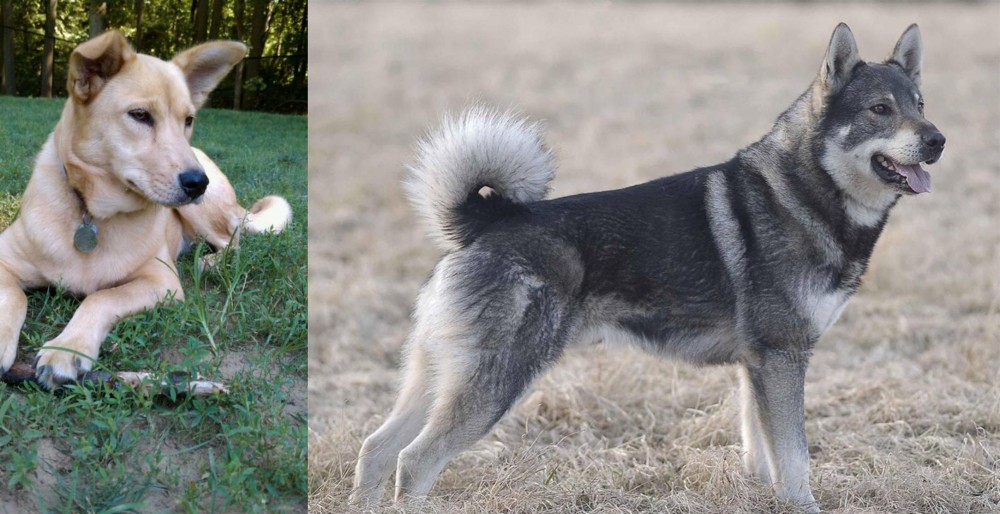 Carolina Dog is originated from United States but Jamthund is originated from Sweden. Both Carolina Dog and Jamthund are having almost same height. Carolina Dog may weigh 15 kg / 33 pounds lesser than Jamthund. Both Carolina Dog and Jamthund has almost same life span. Both Carolina Dog and Jamthund has almost same litter size. Both Carolina Dog and Jamthund requires Moderate Maintenance.
Carolina Dog is originated from United States but Jamthund is originated from Sweden. Both Carolina Dog and Jamthund are having almost same height. Carolina Dog may weigh 15 kg / 33 pounds lesser than Jamthund. Both Carolina Dog and Jamthund has almost same life span. Both Carolina Dog and Jamthund has almost same litter size. Both Carolina Dog and Jamthund requires Moderate Maintenance.
 The Carolina dog comes from wild dogs that used to run with the Paleo-Indians of North America, and today they can still be found in their wild state near the Georgia-South Carolina border.
The Carolina dog comes from wild dogs that used to run with the Paleo-Indians of North America, and today they can still be found in their wild state near the Georgia-South Carolina border.
Many scientists believe that the dog was first domesticated from the wolf thousands and thousands of years ago. Today there aren’t many records on the Carolina Dog’s history and it isn’t sure how long they lived their feral lifestyle in the American South, but it seems as though it was for hundreds of years.
You could say that the modern history of the Carolina Dog started in the 1980s. Dr. Pam Brisbin found a puppy at a dump site which looked like the Australian Dingo. Dr Brisbin and other scientists concluded that the Carolina Dog was a remnant of primitive dogs. Since those times the Carolina Dog has adapted well to being a domesticated pet.
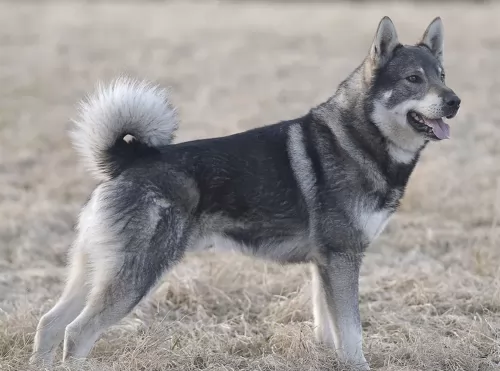 Known also as the Swedish Elkhound or Swedish Moosehound, the Jämthund is a dog which hails from Sweden, and more specifically from a region known as Jamtland.
Known also as the Swedish Elkhound or Swedish Moosehound, the Jämthund is a dog which hails from Sweden, and more specifically from a region known as Jamtland.
The dog received official recognition in 1946 as a dog breed from the Swedish Kennel Club. DNA testing tell us that these dogs originated from the crossing of a wolf, being described as a ‘Spitz-type dog’.
They were once used to pull sleds, and its why today he is an energetic dog, requiring a good dose of exercise and activities from his owners. The UKC accepted the dog as an official breed in 2006.
 The Carolina dog is part of the Sighthounds Group and looks a bit like a Dingo, German Shepherd and Wolf mix. He has fairly long, pointed erect ears, a sharp wolf-like snout and a long tail that curves when raised.
The Carolina dog is part of the Sighthounds Group and looks a bit like a Dingo, German Shepherd and Wolf mix. He has fairly long, pointed erect ears, a sharp wolf-like snout and a long tail that curves when raised.
The Carolina dog has been re-discovered however and when trained and socialized, they make splendid pets. It’s a medium sized dog standing at 45–61cm and weighing from 15–20kg. He is slender, muscular and athletic with a coat that is short and fairly smooth. Colors for the Carolina dog vary and he can be fawn colored, a gingerish color, black and tan and can have some white areas on the paws, chest, muzzle and tail.
The Carolina Dog has been a wild dog, belonging to a pack and while he isn’t aggressive, he is nervous and aloof around strangers. Good training and socialization provides him with the skills to get along well with his human family as well as with children and other pets in the home.
Because this dog has always been wild, they tend to maintain some of their wild, independent nature and they can be difficult to train and it requires firmness and patience with him, but he is an intelligent breed.
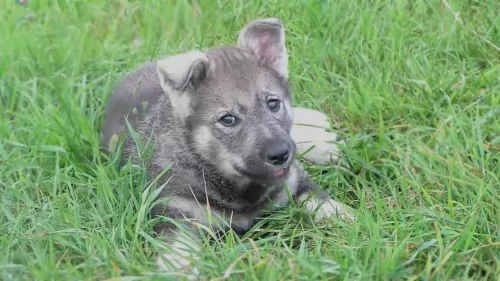 Described as a medium to large sized dog, the Jamthund stands at about 52 – 65cm in height, both males and females, and they weigh in at about 25 to 35 kilograms.
Described as a medium to large sized dog, the Jamthund stands at about 52 – 65cm in height, both males and females, and they weigh in at about 25 to 35 kilograms.
They have that typical Spitz-dog tail which curls over the back of the dog. When relaxed the tail hangs straight down. He has erect ears with a longish muzzle, much like a wolf, and his double coat lies fairly close to the body while on certain areas of the body, such as around the neck and tail, it is longer.
The color of his coat is usually light or dark grey with some cream marking around the muzzle, eyes, legs and paws. This fairly large, Spitz-type dog is certainly an attractive dog that while looking similar to a wolf shares some physical features with the Norwegian Elkhound.
Capable of being a splendid family pet, the Jamthund is an affectionate, loyal dog with his human family, although it is true that some of him hankers back to his hunting days.
He is an intelligent, amicable dog, and therefore training and socializing him is easy as he wants to please.
He is very energetic and won't be content with a life curled up indoors. He wants to be busy and involved with all your activities such as walks, hikes and swimming. He has a thick coat and he loves wintry weather, so the cold won’t stop him from wanting a long walk every day.
 The Carolina Dog is a medium-sized dog which has managed to survive well in the wild environment. It is this life in the wilds which has made the dog to be shy and aloof around strangers.
The Carolina Dog is a medium-sized dog which has managed to survive well in the wild environment. It is this life in the wilds which has made the dog to be shy and aloof around strangers.
They are skilled and intelligent and when domesticated they make extraordinary pets even though he isn’t an overly affectionate dog. It is why he requires early socialization so that he doesn’t grow up shunning humans.
With training however, the Carolina Dog becomes a well-adjusted, loving and social member of the family.
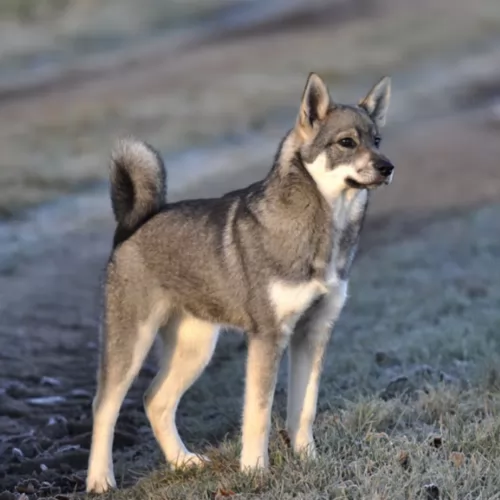 Loving the company of his human family, the Jamthund gets lonely, bored and frustrated if he is put into the backyard as a watchdog and left. When he becomes naughty it is because he is trying to tell you that he wants to be part of your life.
Loving the company of his human family, the Jamthund gets lonely, bored and frustrated if he is put into the backyard as a watchdog and left. When he becomes naughty it is because he is trying to tell you that he wants to be part of your life.
The Jämthund has excellent hunting skills and with his great intelligence too and his ability to learn easily, he makes a popular pet. He also has other attractive characteristics such as being brave and calm.
He forms a deep bond with his human family and his gentle nature makes him a favorite playmate of children too. They make good guard dogs as they are alert and protective of their human family.
Not only has the Jamthund got many positive characteristics to his name, he is an attractive dog too, and once you've brought one into your home you'll realize what a wonderful dimension it brings into your home and your life.
 The Carolina Dog is a fairly healthy breed. You won’t have to be rushing off to the vet often with him if you look after him well in terms of a good diet, a food amount of exercise and plenty of love and attention. In fact breeders of the Carolina Dog have noted that they haven’t seen any cases of genetically inheritable diseases with this robust dog.
The Carolina Dog is a fairly healthy breed. You won’t have to be rushing off to the vet often with him if you look after him well in terms of a good diet, a food amount of exercise and plenty of love and attention. In fact breeders of the Carolina Dog have noted that they haven’t seen any cases of genetically inheritable diseases with this robust dog.
However with all dogs, no matter how healthy they are, there can be problems. Problems common to domestic dogs can include skeletal and visual problems. Many dog owners have their pets tested to identify some of the potential health defects that some dogs are prone to. This can include hip dysplasia, cataracts, cancer and PRA or Progressive Retinal Atrophy.
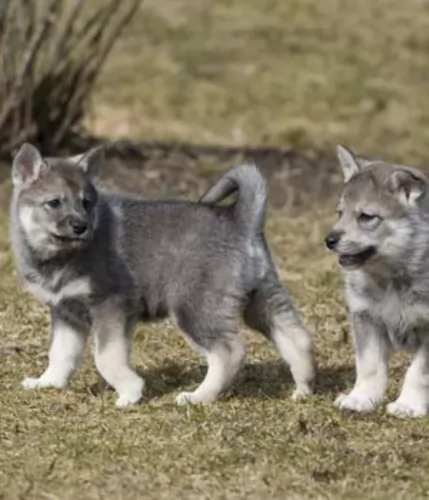 While the Jämthund is a healthy dog breed and won't cost you much in veterinary bills when it comes to illness, there are some common dog illnesses that are worth knowing about so you can respond in time to his need.
While the Jämthund is a healthy dog breed and won't cost you much in veterinary bills when it comes to illness, there are some common dog illnesses that are worth knowing about so you can respond in time to his need.
Unfortunately this is a joint problem that can affect even young dogs. The hip joint hasn't formed properly and it can lead to the development of painful arthritis. It can be a debilitating disease for your dog and you will need to see your vet.
This may seem like a trivial kind of dog illness but in fact it can lead to a lot of frustration, pain, anguish and discomfort for your pet. Signs of a skin allergy can include red, inflamed skin, itchiness, pain and oozing sores where your pet licks away miserably at the affected areas.
 The Carolina Dog is a seasonal shedder and the shortish coat will simply require a thorough brushing twice a week to keep him in tip top condition.
The Carolina Dog is a seasonal shedder and the shortish coat will simply require a thorough brushing twice a week to keep him in tip top condition.
This dog, with his upright ears, isn’t prone to ear infections as other breeds, but nonetheless as part of his grooming routine, its a good idea to to check his ears inside for wax build-up and dirt. Certainly his teeth should be brushed 2 or 3 times a week with special dog toothbrush and toothpaste. This keeps the gums and teeth healthy and also avoids other diseases that come about because of dental disease.
Whether you feed your Carolina Dog once or twice a day, you want to ensure the very best quality diet to avoid skin problems and illness. You also have to ensure your dog has 24/7 access to fresh, cool drinking water to help him with digesting his food.
There are some excellent commercially manufactured dog foods on the market which have been manufactured for certain stages of your dogs life. Add in some rice, vegetables and meat from time to time and every now and again you can give him some raw meat too.
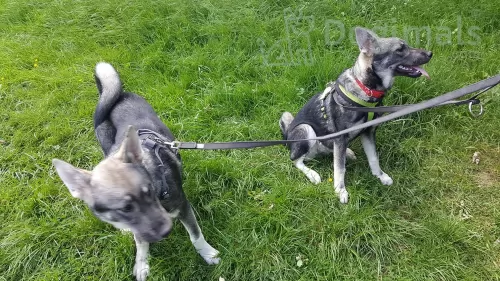 Your Jamthund is a high energy dog and because of his background of hunting and pulling sleds, he loves wide open spaces where he can run. He essentially suits country life and it wouldn't be wise to confine this energetic dog to a small home.
Your Jamthund is a high energy dog and because of his background of hunting and pulling sleds, he loves wide open spaces where he can run. He essentially suits country life and it wouldn't be wise to confine this energetic dog to a small home.
Brushing the thick coat twice a week will keep it in top condition.Keep his nails trimmed and also keep an eye on his teeth. Find out how to make use of canine toothbrush and toothpaste to keep his teeth clean and free of plaque.
Such a high energy dog requires the very best food packed full of vitamins and minerals. Look for the best commercially manufactured food there is and add in some wholesome home-made food from time to time such as cooked chicken, rice and vegetables as well as some raw meat occasionally. He must have a constant supply of fresh, cool water.